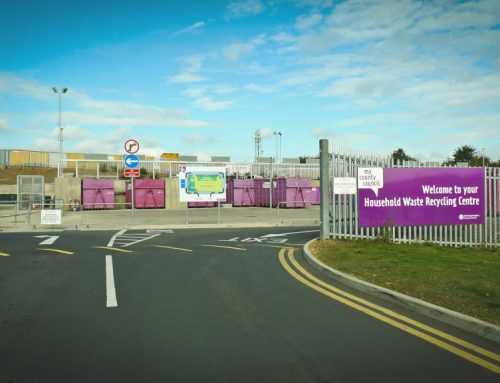by Mike Brown
6 minute read
Funerals often stimulate reflection. Travelling home from Cornish independent Councillor Pam Lyne’s memorial service on 13th July, I was thinking about one of the many causes to which she selflessly dedicated so much energy.
Pam was a tireless campaigner in the long fight against privatising Cornwall’s waste company, County Environmental Services (CES) Ltd, which resulted in the council’s 30-year PFI contract with French utility, SITA. This covers integrated waste management – including the construction of the Cornwall Energy Recovery Centre (CERC), a huge incinerator and energy from waste plant to be built near St Austell. Pam was also a good friend and a trusted and loyal colleague, and in her memory I want to set out some thoughts on why Pam was right to fight for CES and against the expensive and inflexible contract with SITA.
A lost decade
It was a sad coincidence that Pam’s funeral should have come in the same week that the incinerator’s opponents were refused leave to appeal to the Supreme Court, closing off their last legal avenue within the UK courts. It seemingly brings to an end a tortuous planning process: the scheme was initiated by the former county council over a decade ago through the Local Plan process. In 2003 it became the corner-stone of the LibDem-led council’s plan for a 30 year PFI contract; valued at £427m, it was let to SITA in 2006, at which point CES ceased to exist. Somewhat perversely, the same council then rejected SITA’s planning application for the CERC in 2009 – was it a coincidence that the vote came shortly before elections to Cornwall’s new Unitary Authority? SITA appealed to Eric Pickles, but his decision to award planning permission was overturned in the High Court before being reinstated at the Court of Appeal. The cost of the incredibly lengthy planning process is the first and most obvious unrecognised price of the council’s chosen approach.
Back in 2003, when Cornwall County Council adopted the incinerator scheme against a large minority of councillors’ and wider stakeholders’ wishes, I was the Managing Director of CES, which ran at arm’s length from the authority. The decision was the beginning of the end for CES, and I saw it as largely motivated by the desire of some senior officers and members to seize power over waste from a company they could not control (the whole point of being arm’s length of course), rather than to work with CES and other Cornish stakeholders to develop solutions based on consensus.
At that time, Cornwall was in the top 25% of local authorities for recycling. But waste policy was focused on diversion from landfill and influential consultancies like AEA Technology (now facing collapse) were advising that Cornwall’s 15-20% recycling rate was close to the maximum possible (the highest performing English counties are now approaching 60%). The council therefore set its sights on incineration as the best way to divert more from landfill. Throw in £45m of Private Finance Initiative (PFI) credits and other less tangible support from central government, and the big project looked pretty attractive to a lot of councillors. There were also some shenanigans. The most senior officers misleadingly assured councillors that an incinerator-led PFI need not spell the end for CES. Pam, always one to spot a false promise, was not fooled: “Get [thee] behind me Satan” was her response.

The tireless Cllr Pam Lyne – much missed.
The incinerator’s appeal was at best superficial. Its 240,000 tonnes annual capacity is huge in comparison to the 304,000 tonnes of municipal waste Cornwall produced in 2010/11 – down from a peak of 327,000 in 2006/07 – but the size of the incinerator was always dictated more by the project’s finances than by the council’s waste management needs. Even before the contract with SITA was signed, landfill avoidance was sinking down the agenda as municipal recycling rates steadily grew. The great incinerator battle has prevented any significant waste infrastructure development for a decade, and Cornwall has tumbled into the bottom 25% on recycling performance. Waste has continued to go to landfill – ironic for those who remember councillors also being told in 2003 that landfill void would run out within a year; another false argument used by the pro-PFI side to make the case for the urgent need for an incinerator. Ten years of landfill gate fees and tax, and the lost opportunity to save money and create jobs through recycling, are the second unrecognised cost of the CERC.
Locked in to incineration
A third hidden cost has been the way the CERC has prevented Cornwall from responding to change. Once it is built, the need to feed it throughout its lifetime locks Cornwall into low recycling. With incomes from recyclate higher now than a decade ago, the CERC gate fee will cost Cornwall’s tax payers more than would a truly recycling-led approach. The council’s hands are tied. Even if, for example, it wanted to collect food waste for AD as the next step to increase recycling and generate genuinely renewable energy, the terms of the PFI contract would seem to prevent it. Future policy changes like an incineration tax, or a binding recycling target with penalties for councils that failed to meet it would be a real problem for Cornwall.
Lastly, the perils of PFI are now coming to light. In the New Labour years of public sector expansion, a long-term fixed-price PFI contract was not too worrying if it enabled new infrastructure to be built. However, with local authorities bearing the brunt of austerity, a PFI contract now represents a large slab of expenditure that a council cannot control. In Cornwall, the people of one of Europe’s poorest regions are stuck filling SITA’s coffers for decades, even while other services suffer.
As a power grab from CES, the SITA contract backfired spectacularly – Cornwall Council has constructed a PFI trap for itself. It may not feel it can walk away from the CERC project, but perhaps it can still save some money and improve outcomes.
I believe that the important battle now is to make sure that every contractual and moral approach is taken to persuade SITA to take a “haircut”. This doesn’t mean random deductions of payments. Any contractual terms that restrict the council from increasing recycling or otherwise reacting positively to a changing waste world, should be challenged.
If Cornwall is to be stuck with an incinerator that has cost millions to push through, is too big, has held back recycling for a decade and will continue to do so for another three, costs more than the alternatives, limits the county’s ability to respond to change and increases the financial pressure on all other council services… Well, I’m sure Pam would agree it should pay no more for the privilege than it absolutely has to.







Had the pleasure of collecting Pam from county hall doc marts and plants the first thing she said was your early I had to take here to a meeting to Connon bridge hadn’t been doing the job long and took the wrong turning in the back of my mind was thinking my god hope I ain’t late she quipped I’ve never been this way before it’s nice you choose a scenic route I must say you can’t judge a book buy it’s cover she was lovely her bark was worse than here bite god bless xxx
Cornwall Waste Forum, the umbrella group for all people interested in alternatives to Incineration, finally had to put their own alternative in to Cornwall Council because the Council Officers would not consider a Plan B. This was deeply researched by the Forum and took at least a couple of months by four people working more or less flat out.
In the end the alternative was presented to the Council Waste Panel who unanimously voted for it to be sent to the Cabinet with the recommendation that an independent review be commissioned to check it would deliver the savings quoted.
Yesterday (Mon 30th) the Cabinet voted to throw it out, even though they agreed it was workable and would probably deliver the savings. They even agreed that the legal opinion they had received on it had been hastily put together over the weekend via the phone. They also agreed that although the main criticisms were on planning and delivery, at no time had they consulted planners. It seems that once the Contract was signed, there is no going back – even though the savings would be more than the penalty for breaking the contract.
Hearing democracy being nailed into a coffin is not a pretty sound.
The article rasies, for me, three issues – PFIs, waste management contracts and technology.
PFI’s are the choice of very few. They are complicated to arrange, bedevilled by potential problems (early redemption, contractor failure, etc.) and frequently agreed when the moment of need is largely past!
The length of waste management contracts in the UK is a source of amazement in other parts of the World where more contract periods of 3-5 years apply. The typcial 15-20 year contracts in the UK induce inertia in local authorities, reduce flexibility in adapting to/adopting new technologies and largely secure the investment profile of the waste management company. Indeed, largely monopolistic situation now exists in the UK because of this and barriers to entry are high.
Finally, technology! There is a long-standing emotional and irrational resistance in the UK to thermal recovery processes. Many of our continental neighbours have never had access to landfill and, historically, have accommodated much more readily energy-from-waste plants. In the case in question, it is difficult to challenge the proposal. No alternatives are discussed, local authorities averse to taking on debt directly and no environmental assessment discussed, e.g. the climate change impact of alternative, and the impact of the economic downtown hopefully temporary.
Mike’s comments undoubtedly reflect some sentimental views arising from the memory of a late colleague. The reality is that no-one should have got to this stage wihout a balanced and objective view of the implications.
Mike,
Really good article – and I’m a bit more sanguine about the prospect of companies like SITA seeing a haircut as being in their interests than is Phillip. With the cuts that local authorities are facing, they may well start to look as closely as possible at their PFI contract terms to find savings.
Even where the contractual opportunities are limited, I see PFI as having the potential to become the next big controversy to sweep across government, especially if Osborne reverses his former position and goes ahead with a new wave of projects just as austerity starts to lead to PFI casualties amongst NHS trusts and other public bodies.
http://www.guardian.co.uk/society/2012/jun/26/nhs-trust-debt-tory
SITA may not want to take a haircut – but they may also want to avoid becoming synonymous with corporate greed by extracting huge profits from a bad project that Cornwall simply can’t get out of. Or am I naive in thinking that corporate reputation counts for something?
Mike
I have thought for a long time that Cornwall had a bad solution – you have succinctly explained why. If those who took the original decisions can bring themselves to revisit the issue they must see that as it stands the contract is an expensive problem for them. As you say money will be tight and without changes I can see recycling collections actually going backwards.
I suspect that SITA if they were bidding the contract now would have gone for a different solution. But I can’t see them taking a haircut without some quid pro quo. Perhaps there is some opportunity around commercial and industrial waste streams or residual waste from outside Cornwall?